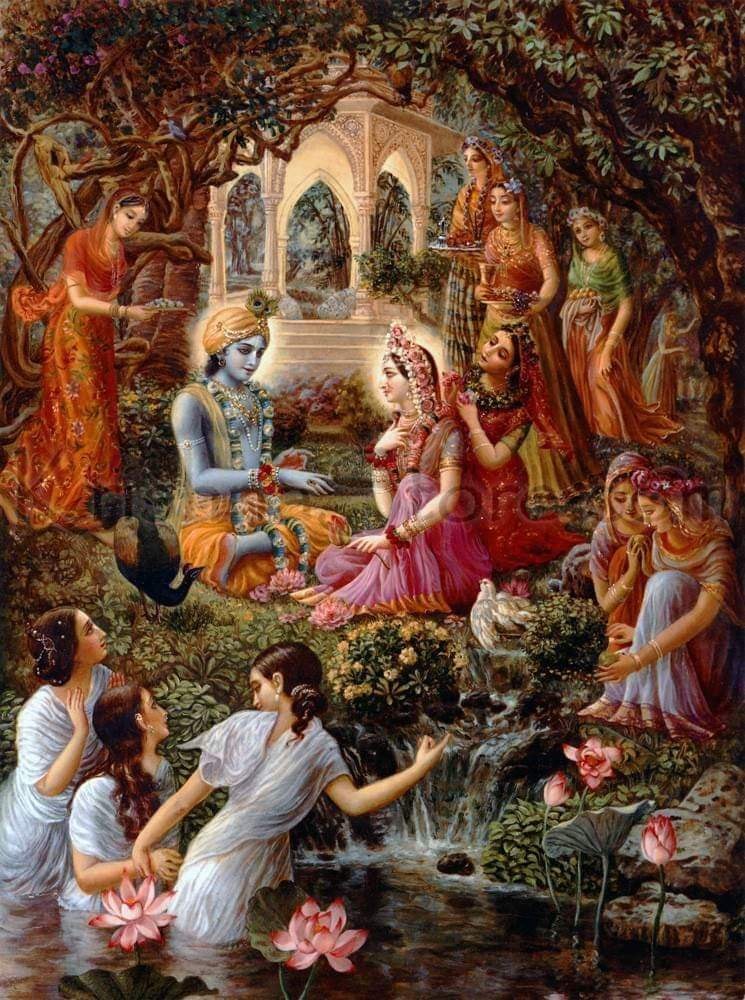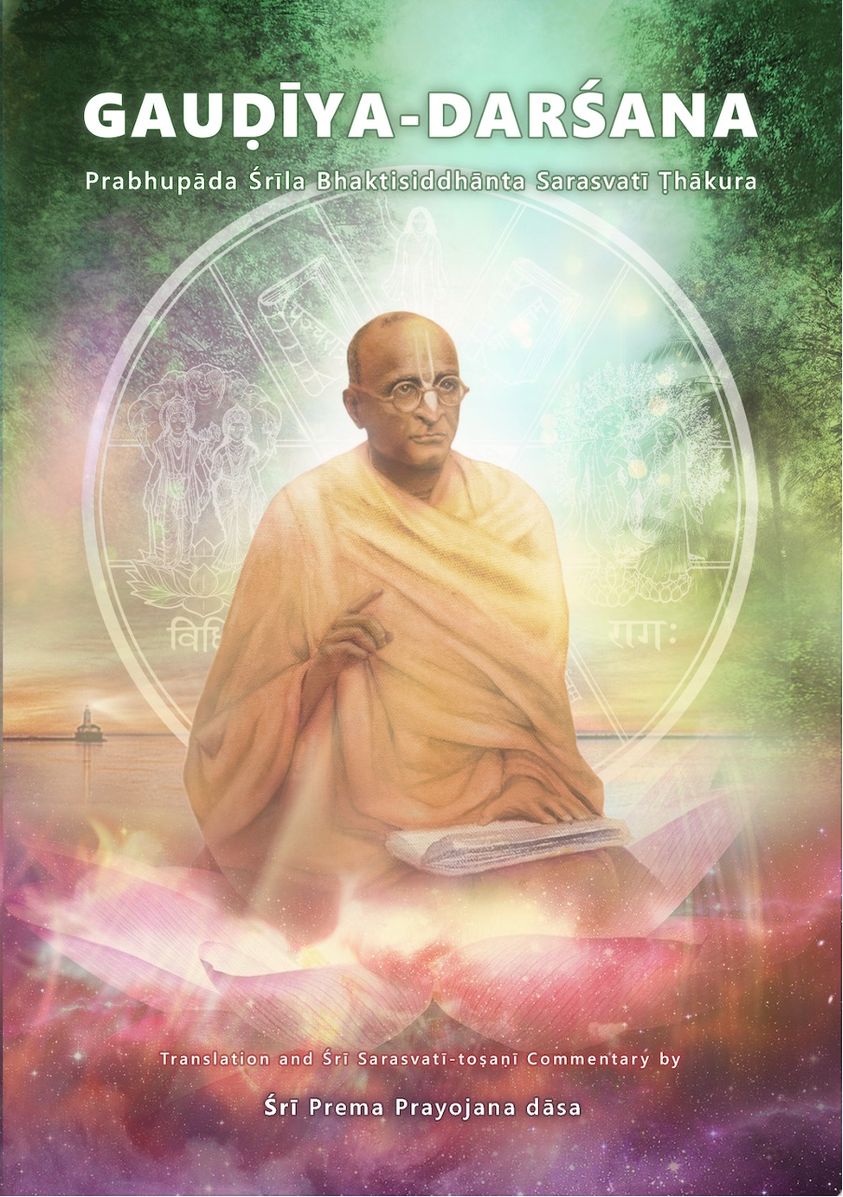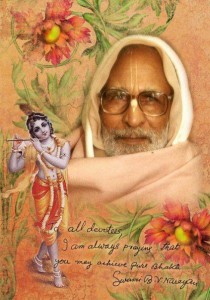
Srila Bhaktivedanta Narayana Maharaja
By Srila Bhaktivedanta Narayana Maharaja
Achieving happiness through material prosperity is the first and most popular goal of life mentioned in the Vedic scriptures. By acquiring wealth and fame or pandering to sensual pleasure, we strive to enjoy our lives in this world of physical experience. Anyone in this world can
acquire all kinds of temporary material pleasures if one's ambition is sufficiently intense. Parts of the Vedic scriptures clearly outline this process. These specific passages are compared to a wish-fulfilling tree that can actualize all of our desires, as they deal exclusively with assisting those persons inclined towards achieving material objectives. Every variety of material pleasure that we could possibly strive to obtain is described, including pleasures found on the higher planets as well. Some call the higher planets "heaven" because, in some ways, they appear to be similar. However, the scriptures indicate that even these planets are not eternal and the souls there must eventually return to this planet earth. Many in this world who have not been fortunate enough to hear about higher spiritual goals naturally seek the gross pleasures of the body and basic sensual gratification, or they seek subtle pleasures of the mind and intellect.
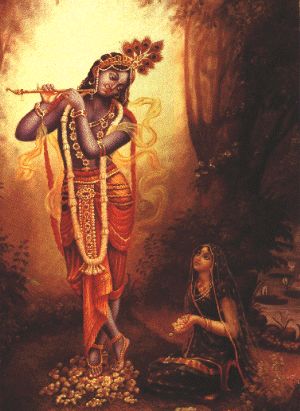
Radha and Krishna
MATERIAL GAINS ARE NOT THE ULTIMATE PATH
By good fortune, some begin to understand the futility of chasing ephemeral material goals and they inquire about and seek out an authority who can guide them to a deeper level of awareness. At this time, one may hear scriptures such as the Bhagavad-Gita which explains, "An intelligent person does not take part in the sources of misery, which are due to contact with the material senses. O son of Kunti, such pleasures have a beginning and an end, and so the wise person does not delight in them." Realizing that our chronic pursuit of material pleasure does not actually bring any real or lasting happiness, we may long in our hearts to become completely free of persistent material desires. We might then begin to seek liberation from this cycle of constant activity in which all of our actions create pleasurable and unpleasurable consequences. For every action, there is an equal and opposite reaction, just as the movement of a pendulum in one direction secures its inevitable swing back the other way. Whatever happy state we may achieve is transitory, followed by a miserable one not far behind. In the same way, a small child seems happy one minute and is crying the next. Even if our performance of worthy actions brings us pleasurable results, the happiness we experience is only temporary and, when it passes, misery again ensues.We thus conclude that liberation from this cycle of performing actions and receiving their reactions is the only goal worth pursuing. Furthermore, the external material path does not bring any lasting pleasure and is simply a cause of bondage. Whatever is subject to decay is material, not spiritual. Material gain always brings only temporary, flickering happiness. The Vedic scriptures inform us that we are more than our temporary, physical bodies. We are the eternally blissful souls within these bodies. Therefore, transitory, external pleasures do not bring us, as souls, any real happiness. As we reflect upon these truths, our outlook will be broadened and we may choose to turn to a path of inward contemplation. As intelligent spiritual beings, why should we settle for less?

Sri Sri Radha and Krishna
THE PATH OF LIBERATION
Why do none of us wish to die? One great sage declared it most amazing that in this world everywhere around us all forms of life, including people, trees and animals, are dying, yet we don't believe death will actually come to us. The Vedic scriptures state that the soul is eternal in nature and, therefore, never dies. They also reveal that the soul is full of bliss, so it is inherent within our minds to seek out our true and higher blissful nature, which is also our real wealth and happiness. The nature of the soul is to reside peacefully in the eternal present, free from the dualities of past and future and from the burden of material desires. The nature of an uncontrolled mind is exactly the opposite. It is to be always restless and full of desires, constantly engaged in the process of planning for oneís future enjoyment. Understandably, the path of liberation from the sufferings and sorrows of worldly life appears very attractive. In fact, many of us pursue this goal and often perform rigorous practices, called austerities, to achieve its end. Pursuing liberation from the cycle of activities and their ensuing results is certainly a higher and nobler goal than endeavoring to enjoy material pleasures. Liberation from the attempt at enjoyment of the material world is an eternal aspect of the soul.
One can reach this consciousness by following these four practices:
- 1. Discriminate between what is temporary or perishable and what is eternal or spiritual.
- 2. Renounce all desire for the temporal rewards and pleasures of this world and also those of the higher heavenly planets, which have been described as temporary in the Vedas.
- 3. Develop control of the mind and senses.
- 4. Attentively cultivate the desire to become a liberated person.
As previously mentioned, the Vedic scriptures are like a wish-fulfilling tree that can give us anything we may desire. They illuminate life's different goals and clearly define the practical methods necessary to achieve them. Liberation is described as a state of purified consciousness wherein the soul realizes his individual nature, thus becoming self-realized. The nature of the liberated soul is to be completely self-satisfied and fulfilled. The soul resides inter-nally in a blissful state of autonomy, beyond and free from all desire to enjoy anything within this material world. One can imagine such a state of consciousness with the help of a material example. Suppose we have just finished eating a healthy meal. As we lie back on a comfortable bed and peacefully enjoy the company of our family members, all of our senses feel satisfied. Because the senses are pacified at this point and because we are not suffering, our consciousness is able to dwell in the present moment.We are neither hankering after nor making plans for our future happiness, nor are we remembering anything from the past. Instead, we are relishing the present moment through experiencing some cessation of suffering in the material world. That internal "thought generator" ñ the talkative, demanding mind ñ is switched off momentarily. In this condition, we consider ourselves to be happy. Such a condition is likened to the consciousness of one who is liberated from desires because, momentarily, we have no desires. Being satisfied, we appreciate for an instant the essential present. This example is mundane, as the moment of satisfaction is flickering and brief. In contrast, the fortunate soul who achieves liberation from the bondage of material desires experiences a much greater satisfaction. Furthermore, that bliss is everlasting in nature.
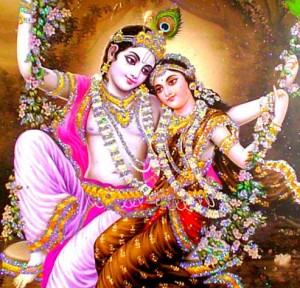
Radha And Krishna
CONTEMPLATING TIME
Within this world, there are three stages of time: past, present and future. Generally, we find it difficult to reside in the present moment because it is too painful, being filled with the harsh "close-up" of our seemingly overwhelming responsibilities. Also, inevitably, we suffer numerous miseries caused by others, by adverse weather conditions or by our own minds. We usually imagine a happier situation further on in life than this current difficult one, so the mind reaches out to conceive a plan, a future dream, to escape this present unhappy condition. The mind's constant engagement is contemplation of how to manipulate the material situation to our own advantage and how to exploit external resources for our personal satisfaction. The mind wants only to enjoy. All of us want to enjoy; it is our nature. Throughout our lives, we try to solve the mystery of not only just how this can be done, but also of how to enjoy at every moment. This is our constant struggle. The natures of the material mind and the spiritual soul are quite different. The mind is an instrument for reaching the soul. The soul has no desires to fulfill and is always joyful, whereas the mind is the opposite, being full of desires. Since, in this material state of consciousness, we tend to identify more with the mind than with the soul, we suffer frustration when these desires are not fulfilled. Only then, if we are fortunate, do we grasp the concept that there is a deeper truth. At this time, one turns inward towards the light of the soul.
BEYOND LIBERATION
At this point in our development, we find an amazing concept to consider. The scriptures encourage us to journey still deeper into a higher state of consciousness that is beyond even the apparently blissful state of liberation from this world. In fact, being free from all suffering is the negative aspect of real liberation. The positive aspect is that the opportunity is available to develop an intimate and loving relationship with God. If, in the state of liberation, we retain our previous identities as people of this world, rather than identifying ourselves as pure servants of God, then we have not yet reached our final destination. This type of liberation is known as "impersonal liberation" and is not our highest prospect. The cessation of all material suffering is the negative aspect of highest joy. The highest joy is awakening our original relationship with God Himself in a loving, affectionate way. The bliss derived from impersonal liberation is limited, because the soul is relishing a relationship only with himself. This is a somewhat miserly affair, since loving service to another being is not an important consideration. At this stage, we have only tapped into a blissful aspect of our inner self; we have not yet accessed the full-blown ecstasy of a reciprocal and loving relationship with the Supreme Soul.
The highest joy attainable is described as a pure, unalloyed, loving relationship with God Himself. Millions of songs glorify the sweetness of relationships in this world. However, neither the songs last nor do the flickering moments of love described by them. Even if the loving relationship appears to endure, it is ultimately terminated by inevitable death. The soul constantly craves a more lasting relationship to be fully satisfied. Any loving relationship requires the participation of two persons. The word "love" is equally a verb, which means it is active in principle, as in to love someone or something. One type of bliss is the soul's joyous experience of freedom from worldly sorrow. A greater source of bliss comes from the soul's re-awakened, eternally loving, relationship with God. This kind of bliss has no boundaries at all.

Hear and chant Krishnas Holy Names
WHAT IS TRUE LOVE?
Since the beginning of time, the soul has been crying piteously for love and affection. Love is the most powerful force in the universe, and we all crave to taste it somehow or other. We don't want to experience it temporarily, but instead want to relish it forever. This, in fact, is our birthright. We can experience so much of life while our most central need, the need to love and be loved, remains unfulfilled. Love's power is unimaginable. The attraction of love is the most fundamental and formidable element found in every circumstance in the world. All else can be eliminated and forgotten if we come in touch with true love and affection. When one questions or challenges the principle of love, one has to accept defeat. Love is the most substantive principle. The key to understanding the difference between the two types of bliss mentioned above, one achieved from impersonal liberation and the other attained by devotion to God, is to appreciate the nature of love. Since "to love" is a verb, it is implied that we must consider whom to love. The bliss derived by achieving impersonal liberation comes from the cessation of misery, which provides a peaceful state of consciousness, free from gross material desires.
However, this state cannot be called love and, really, it has nothing to do with love. In it, the heartfelt warmth of a loving relationship does not exist. The highest state of absolute and pure love can truly exist only between the soul and God, both of whom are eternal personalities. Our present nature, which has been conditioned by countless births, drives us to exploit God's energy for our own ends and has denied us an acceptance of His beautiful, personal presence. This is because we seek our own power and glory in life. This material endeavor usurps the rightful, central place in our lives of that most precious, wonderful personality, God. This misfortune leads us away from a spiritual, theistic path to an impersonal, atheistic one, where all-encompassing love is replaced by all-dominating fear. The sincerely inquiring seeker, however, can only be misled for so long. Sooner or later, he will raise his head and inquire as to the reality of eternal love.
THE PATH OF DIVINE LOVE
The path of devotion and loving service to God (bhakti) is described thoroughly in the Vedic scriptures. The sages of the past understood humanity's heartfelt needs and have clearly instructed us how to achieve complete satisfaction by linking with our supreme master and beloved Lord. In the story of the king who wanted to see God, the king was asked if butter was in the milk. He replied, "Yes, but a process must be followed to be able to see it." Similarly, if we desire to reawaken our eternal relationship with God, we must follow the sacred process outlined by the sages and heed their instructions. Without this divine instruction, we can never awaken our spiritual relationship. This cannot be done on the strength of our own efforts alone. Strength beyond this world is required. Divine mercy and grace are essential. From where and how can we obtain this power?

Krishna The Supreme Lord
WHERE TO FIND STRENGTH
To tread the exalted path of divine love, we need knowledge, support and strength from someone who is already situated on the path. A person who falls into a deep well can only be saved by one who is fixed on safe, firm ground above and able to lower a rope. Similarly, we can only be saved from our suffering condition by one who knows and understands the essential truths of life. In fact, there is no other way out of our dilemma! We must make it our priority to find such a person. With this desire in our hearts, most assuredly, that representative of God will soon come to us. Our only requirement is to be greedy enough to meet such a personality. Then, by divine arrangement, we will be led to him or her very quickly.
LOVE AND RELATIONSHIPS
The Vedic scriptures describe the name of Krishna as being the topmost name of God. In Sanskrit, Krishna literally means "the most attractive one." God's Sanskrit name gives us an insight into His personality. Even though Krishna is the cause of everything and the supreme ultimate Truth, He relishes astonishingly affectionate and intimate relationships with an enormous number of family members and friends in His eternal spiritual realm, especially in Vrindavana, the most beautiful and charming of all His abodes. These eternal friends and relatives are with Him when He performs various loving activities so wonderful and amazing, they simply stun the heart and mind. These pastimes have been elaborately described by great and saintly personalities who, in their meditations, have witnessed exquisite exchanges of loving affection between Krishna and those very close to Him. Our eternal home is in the spiritual world with Krishna. There we experience the highest bliss and the most powerful and ecstatic sense of self in our eternal relationship with Him. Those who aspire to impersonal liberation ultimately aspire to be Krishna Himself. That is not possible ñ just as you can never be me and I can never be you. We can never be God, who creates unlimited universes etc.

Radha and Krishna in the spiritual World
HOW TO MEDITATE
In this present age we are most fortunate that the process prescribed to attain that blissful relationship with God, through self-realization, is simply to chant God's holy names. Even Jesus Christ begins his most prominent prayer by glorifying God's name: "Hallowed be thy name." Krishna has implanted all power and energy within His names, along with the opportunity to enjoy the most fulfilling relationship with Him. This process of chanting is transcendental and, as our faith in it grows, the power of the holy names will gradually illuminate our consciousness. We can, in fact, achieve any of the three goals previously described simply by chanting. If you are not convinced, try it for yourself and personally taste the results. Chanting the most powerful names of God, we begin the process of linking ourselves forever with God or Krishna. This great chant of deliverance is called the maha-mantra. It is as follows:

The Hare Krishna Mantra. Man means mind and tra to free
If we practice chanting this mantra, we will definitely experience a higher state of consciousness. Careful, meditative chanting is recommended, although chanting at any time, anywhere and in any condition brings increased bliss.
Chanting transports us into an ocean of love, especially when combined with guidance from scripture and wisdom from those whose loving relationship with Krishna is already developed. There are many names for God, such as Jehovah, Allah, Buddha, Yahweh, Rama and Krishna. Of these holy names, the Vedic scriptures describe Krishna and Rama as the best and most auspicious names to chant for the greatest results and benefit.
CONCLUSION
The intrinsic nature of the soul is to enjoy. Our aim and objective in life is to become completely happy. We attempt to accomplish this goal in three different ways:
- 1. We enjoy temporal pleasures through our gross material senses.
- 2. We enjoy renunciation and striving for liberation through our subtle senses.
- 3. We enjoy through our original spiritual senses as devoted servants of God, Lord Krishna.
Individually, these three paths do not ultimately lead to the same goal. The first two paths of enjoyment through the material senses and impersonal liberation do not necessarily lead us to the third and highest path of truth: engagement in a pure, unalloyed, loving relationship with Krishna Himself. The degree of pleasure derived from the first path is minuscule compared to the second one. On the scale of bliss, the second path does not even register when compared to the bliss of the third path, where we reawaken our loving relationship with Krishna, God Himself. This truth can only be understood and realized by the practitioner. The information provided in this little book is a fraction of the vast amount of knowledge available in the Vedic literatures. Here we describe a small portion of these scriptures in very simple words. If, as a result of reading this, you are inspired to inquire further from persons dedicated to serving Krishna, this booklet will have been a success. If you would like more information on these fascinating topics, the Hare Krishna movement has translated many of the Vedic literatures into English, as well as many other languages, for our eternal benefit. These books are available everywhere. You only need to desire one and, as if by magic, it will very quickly arrive in your hands.
Hare Krishna

 Posted in
Posted in 





